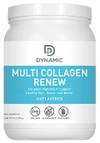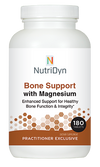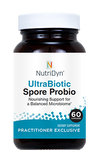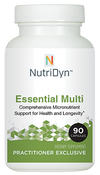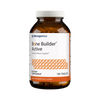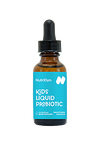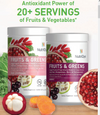Omega-3 fatty acids are an important part of the human diet, and they play a crucial role in many bodily systems, including heart, brain and joint function. These fats—found in a variety of foods like fish, flaxseeds and walnuts—are known for their anti-inflammatory properties and potential to reduce the risk of chronic diseases such as heart disease and even arthritis.1 Despite the presence of omega-3s in foods, supplementation may be necessary for some people, as omega-3 deficiency has been associated with depression, reduced ability to learn and higher risk of certain types of cancer.2 If you’re curious about whether a supplement is right for you, talk to your doctor or registered dietitian.
If you do choose to supplement, it’s important to get the most out of your omega-3 supplement by prioritizing bioavailability. In this article, we delve into advice from registered dietitians on the best time to take omega-3s as well as other factors to consider in order to optimize their absorption.
- benefits.
- Additionally, prioritizing freshness and avoiding high-fiber meals can further help you utilize these essential fatty acids.
- Always talk to your doctor or registered dietitian before trying something new to get individualized advice.
When Should I Take Omega-3s for Maximum Benefits?
- News
- 26 Aug, 2024
- Posted By: Vivienne: Savourer bon ami
We used the following article to create this blog: "The Best Time to Take Omega-3s for Maximum Absorption, According to Experts." By Kristen Carli, M.S., RD Carli, M.S., RD. Updated on August 20, 2024 Reviewed by Dietitian
Omega-3 fatty acids are an important part of the human diet, and they play a crucial role in many bodily systems, including heart, brain and joint function. These fats—found in a variety of foods like fish, flaxseeds and walnuts—are known for their anti-inflammatory properties and potential to reduce the risk of chronic diseases such as heart disease and even arthritis.1 Despite the presence of omega-3s in foods, supplementation may be necessary for some people, as omega-3 deficiency has been associated with depression, reduced ability to learn and higher risk of certain types of cancer.2 If you’re curious about whether a supplement is right for you, talk to your doctor or registered dietitian.
If you do choose to supplement, it’s important to get the most out of your omega-3 supplement by prioritizing bioavailability. In this article, we delve into advice from registered dietitians on the best time to take omega-3s as well as other factors to consider in order to optimize their absorption.
- Understanding optimal timing and staying consistent are key. Omega-3s play a vital role in many body systems,
- Their effectiveness can be influenced by how and when they are taken.
- Ensuring that supplements are consumed with meals containing healthy fats can help enhance absorption,
- Regular intake helps maintain adequate levels in the body for long-term benefits.
- Additionally, prioritizing freshness and avoiding high-fiber meals can further help you utilize these essential fatty acids.
- Always talk to your doctor or registered dietitian before trying something new to get individualized advice.
 OmegaGenics® EPA 1200 Lemon Lime M
OmegaGenics® EPA 1200 Lemon Lime M
Type
There are three main types of omega-3 fatty acids: EPA, DHA and ALA. EPA and DHA, which are often found in fish oil and algae oil, are typically easier for the body to utilize.
ALA, often found in plant-based sources such as flaxseed, walnuts and chia seeds, needs to be converted into EPA and DHA in the body before it can be used. However, this conversion is fairly inefficient, with only a small amount of ALA turning into EPA and DHA.3 Because of this, it’s recommended to seek out EPA and DHA in omega-3 supplements if you don’t avoid animal products.
As you shop for omega-3 supplements, you’ll notice that sources of these essential fatty acids vary. Research shows that absorption varies depending on the source, so it’s key to keep this top of mind when purchasing. Below are three of the most common omega-3 supplement sources.
- Fish Oil: While fish oil is rich in EPA and DHA, it’s recommended to choose high-quality fish oil to avoid contaminants like heavy metals.
- Krill Oil: Krill oil also provides EPA and DHA but, as registered dietitian Keelin Murphy, M.S., RD, of Third Eye Nourishment, notes, “Krill oil has been shown to be more bioavailable than fish oil.”4 Additionally, krill oil contains the powerful antioxidant astaxanthin, which has been shown to help reduce oxidative stress.5
- Algae Oil: Algae oil, on the other hand, is primarily composed of ALA, with some varieties fortified with EPA. These options are plant-based, making them a good choice for those following a vegetarian or vegan diet.
Physical activity level is an important factor to consider when determining omega-3 supplementation needs, as it directly influences the body's demand for this essential fatty acid. For athletes, the anti-inflammatory properties of omega-3s can be particularly beneficial. Murphy notes, “Supplementation with omega-3s has been shown to increase performance, enhance recovery, reduce muscle soreness and lower risk of injury."
Conversely, less-active individuals may have different omega-3 requirements. However, Murphy adds, “I recommend all of my athletes and most of my non-athlete clients to take fish oil, or some form of omega-3 fatty acid supplement” as most Americans don’t get enough through their typical diets. While anyone can benefit from the cardiovascular and anti-inflammatory effects, less-active individuals may not require as many omega-3s as those with more active lifestyles.
Morning vs. Evening
As Murphy notes, “There needs to be more research done to give timing recommendations on omega-3 supplements. Mostly because measuring bioavailability is difficult.” She goes on to add, “One study observed better heart-health outcomes when supplementing at dinner, and worse health outcomes when supplementing at breakfast, attributing these results to circadian rhythm and stomach acid oxidation when consumed on an empty stomach”.6
However, registered dietitian Jaime Bachtell-Shelbert, RD, of Wholly Nourished, brings up an interesting point: “For those who experience reflux and the unwanted fish taste after taking an omega-3s, I recommend a split dose by taking half a dose before breakfast and the other half before dinner.”
Probably most importantly of all, the presence of fat in the digestive system aids in the digestion and absorption of these essential fatty acids. Because omega-3s are fat-soluble, it’s recommended to consume them with a fat-containing meal to enhance their bioavailability. As Bachtell-Shelbert explains, “It is recommended to take omega-3 supplements immediately before a meal that includes healthy fats. Doing so avoids floating oil in the stomach and promotes mixing with the meal for better digestion.”
Tips for Enhancing Absorption of an Omega-3 Supplement
Avoid Taking with High-Fiber Meals
It's a good idea to avoid taking omega-3 supplements with high-fiber meals because fiber can make it harder for the body to absorb these nutrients, by binding with the omega-3s or reducing how well the body absorbs them.7 For the best results, it’s recommended to take these supplements with meals that contain moderate to high levels of fat, but lower levels of fiber.
These fatty acids work best when they build up to sufficient levels in the body over time. Regular consumption of these supplements helps to ensure steady levels of omega-3s within the body. Missing doses or taking them more sporadically might reduce their effectiveness and hinder their long-term benefits.
Murphy adds, “It’s also important to consider that fish oil and other supplemental sources of omega-3s can go rancid after time. I recommend purchasing new supplements every three to four months to ensure optimal absorption.”
No literature or Web Searches:
www.drdirect4u.com, Dr-Direct2U, LLC, and its representatives do not conduct searches of the medical literature or of information contained on the World Wide Web for persons accessing this site and requesting such searches.
The information posted here at DrDirect4u.com, Dr-Direct2U, LLC, and its representatives should not be considered medical advice and is not intended to replace consultation with a qualified health care practitioner. www.drdirect4u.com, Dr-Direct2U, LLC, and its representatives will not answer specific medical questions or refer people to a particular health care.
About Blog
We're more than just a store. We're putting over 100 collective years of functional nutritional education and experience into the articles we write and share. Check out our recipes, tidbits, and updates to stay informed.
Recent Posts
-
-

-
When Should I Take Omega-3s for Maximum Benefits?
26 August, 2024
-
-
-

-
Can Exercise Help Manage Diabetes?
26 August, 2024
-
-
-

-
Don't Forget Back to School Health and Nutrition
10 August, 2024
-
Tags
- All
- Air Fryer Recipes
- anti-aging effects*
- antioxidant cellular activity
- Appetizers Healthy
- Arthritis Relief
- avocados to truffles and lobster.
- Big Box Retailers
- Brain Health
- cardiovascular disease.
- Children's' Health
- Comfort Food
- Dairy Free
- diabetes is increasing globally at 4% per year.
- Disinfect Your Groceries
- Eat Takeout?
- Evils of salt
- Evils of Sugar
- Evils of western diet
- Food to Increase Longjevity
- gastrointestinal health
- gluten free
- Gluten Intolerance
- greens
- gut microbiome
- Healthy
- healthy cardiovascular
- healthy immune response
- healthy prostate enzyme
- hypertension or high triglycerides.
- Improve metabolic path ways
- Major improvements to www.drdirect4u.cp
- Metagenics
- Never Buy Vitamins
- New York's Attorney General’s Office lab test
- Obesity
- PEA: Pulseless electrical activity
- Promotes vitality. Supports healthy body composition
- promoting joint comfort
- Reed Wilson
- sakt
- Sum
- Summer Picnic
- Supplements
- Supplements ... From Big Box Retailers
- Supports athletic performance and active lifestyles*.
- Supports healthy bone mineral density and muscle strength*
- Tempeh
- Tofu
- Type 2 diabetes and fatty liver disease
- Vegan
- Vitamins
- Vivienne
- Womens Health








